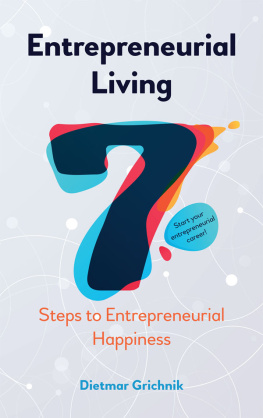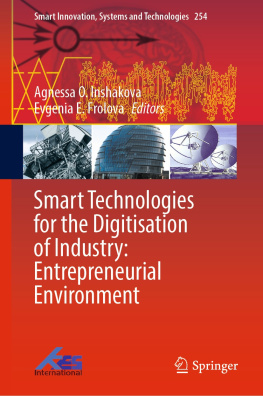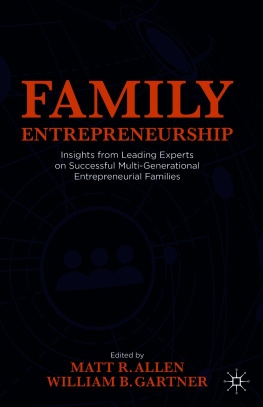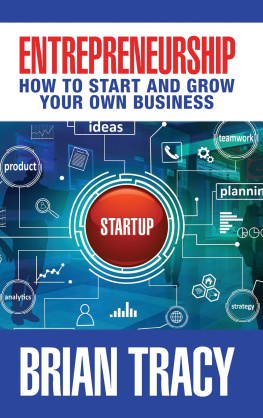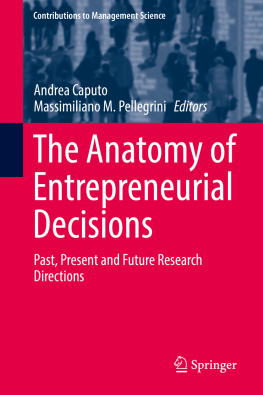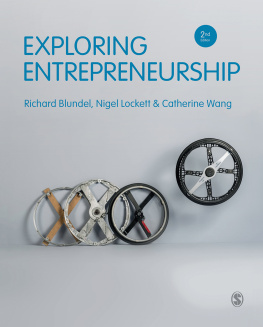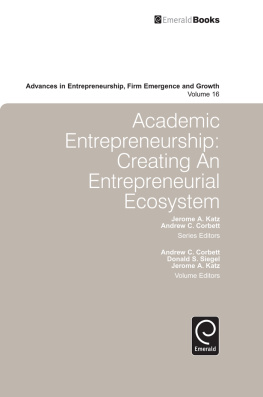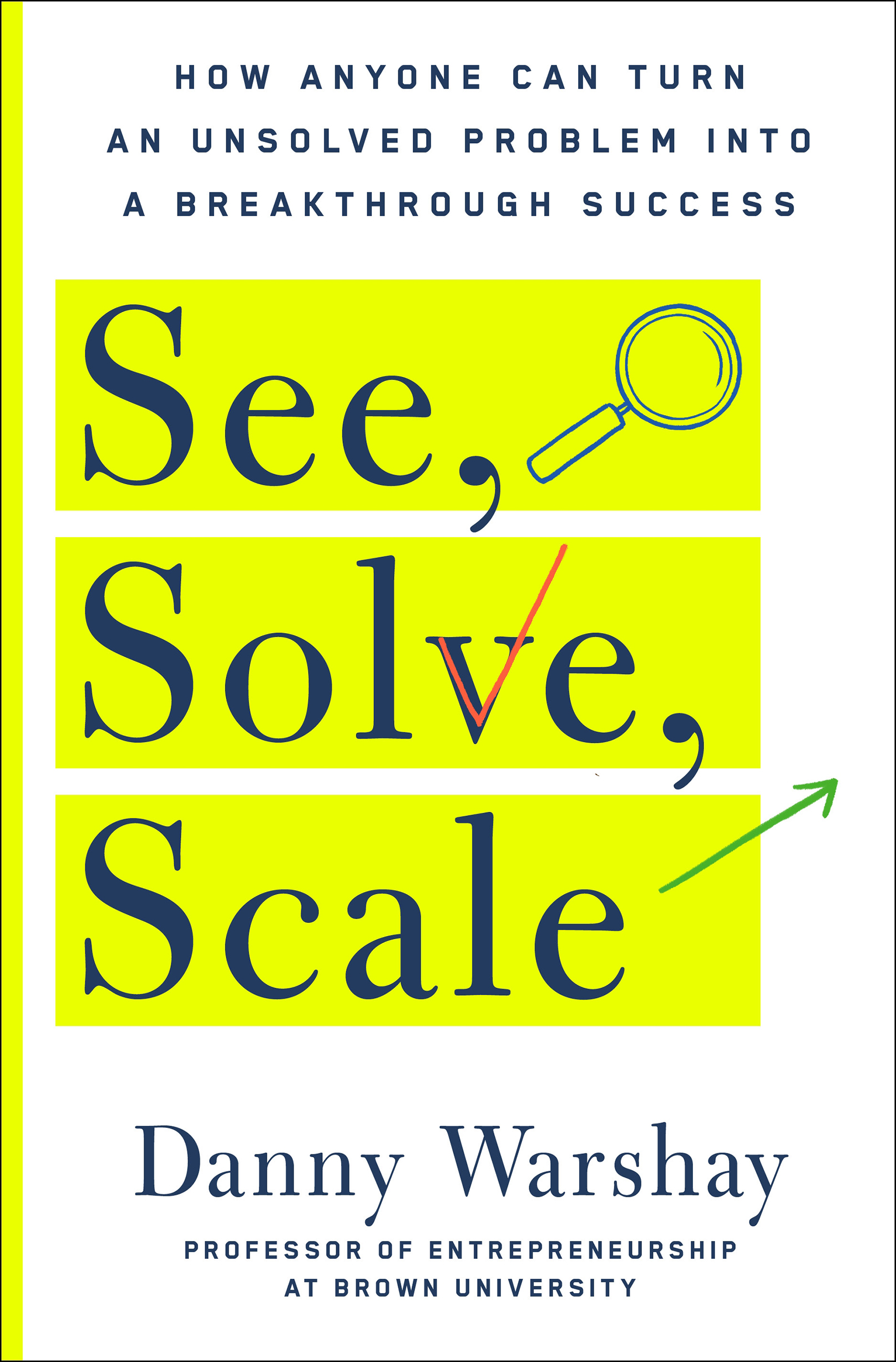Contents
Guide
Pagebreaks of the print version

The author and publisher have provided this ebook to you for your personal use only. You may not make this ebook publicly available in any way. Copyright infringement is against the law. If you believe the copy of this ebook you are reading infringes on the authors copyright, please notify the publisher at:
us.macmillanusa.com/piracy.
For my family, especially the memory of my father
Vision without action is just a dream, action without vision just passes the time, and vision with action can change the world.
NELSON MANDELA
Food scarcity, illiteracy, inequitable access to education, climate change, violent conflict in the Middle East, poverty, pandemics: as a society, we face these problems and so many more that are in dire need of solutions. As individual consumers, we also confront problems daily, such as challenges to our sleep-related experiences and confusing dietary choices. In big companies and other established organizations, we face problems that result from doing things the same way for too long, fail to innovate, and risk obsolescence. And our research scientists, on whom we rely to discover solutions to many of these kinds of problems, are frustrated when their standard research methods no longer create the breakthroughs we count on. More than ever, we need to see and empower ourselves as entrepreneurial problem solvers, even if we have been held back by a lack of confidence and training, to develop large-scale solutions with impact.
The premise of this book is that anyone can become an entrepreneur and a solver of problems when armed with the right toolsnot just those who conform to the entrepreneurial myth of swashbuckling heroes unbound by rules, on the hunt for unicorns. I have written this book to empower those of you who may not see yourselves as an entrepreneur because you dont fit this stereotype. This does not mean that the process is easy. Its challenging, and it can be frustrating and even intimidating. It also does not guarantee you success. But my experience teaching entrepreneurship to thousands of students has shown me that there is a vast, untapped entrepreneurial layer of society that has been neglected because of strong biases the conventional world of entrepreneurship sustains. At the same time, this book is designed to solve a problem all entrepreneurs face: too often, they are making things up as they go, relying on instinct and intuition in places where a structured process would make their lives easier and more efficient and their startups more successful.
Just as all new products need to offer something that differentiates them from their competitors, the See, Solve, Scale Entrepreneurial Process does this in three ways:
- It teaches entrepreneurship as a structured process for solving problems , using an anthropological approach to figure out what problem to solve. This prevents the expensive and often fatal mistake many entrepreneurs make of developing a solution in search of a problem.
- It teaches entrepreneurship as a liberal arts skill . Like other liberal arts, we can adapt its lessons across all types of contexts, from classic business startups to established corporate, nonprofit, and governmental organizations, and even more unexpected contexts like academic research labs. Studying history in college did not make me a historian, any more than learning the scientific method makes people scientists. And yet I have drawn on my history training, and science students draw on theirs, in all sorts of unexpected ways. The See, Solve, Scale Entrepreneurial Process has produced many traditional entrepreneurs, including some you will meet in these pages. It has also empowered many within established organizations and elsewhere who previously had not seen themselves as entrepreneurs.
- It is based on rigorous scientific research and is animated by entrepreneurship experiencesmy own and many others. This practice-backed-by-research draws from my combined roles as entrepreneur and teacher.
Once you see how See, Solve, Scale works, you will see why the standard notion of who can be an entrepreneur is so limiting. If you are what I call an entrepreneurial underdog, you will become unleashed from self-doubt and armed with a system proven to help you tackle this process. If you are an investor, you will start to uncover a broader pool of potential entrepreneurs whom your competitors may never consider. Among the things you will learn:
- Entrepreneurs do not need abundant resources . In fact, early in this process, scarce resources can be a benefit and abundant resources are often a burden. After reading this book, you wont worry about not having enough money, expertise, education, or pedigree. And if you happen to have abundant resources, you will learn techniques to prevent those resources from getting in your way.
- There is no entrepreneurial psychological type. For example, you do not need to be an extrovert. In fact, the creative strategies of introverts add disproportionate value to entrepreneurship teams. Research I will share proves that diversity is a critical characteristic of successful entrepreneurship teams. As an important part of this diversity, different personality types complement each other and lead to greater success. You will no longer feel blocked because your personality differs from the image of the stereotypical entrepreneur.
- Entrepreneurs do not need to come from, live in, or be trained by the right crowd, such as Silicon Valley, developed countries, or elite universities. They do not need to adhere to gender and racial stereotypes. I realize that when only 2.3 percent of venture funding goes to women, This approach can and should change. While far too often sexism, racism, and unconscious bias perpetuate these numbers, the hopeful news is that you are more likely to succeed if you recruit diverse team members from beyond your own crowd and beyond your own strong network ties.
- Successful entrepreneurs dont always invent something from scratch . You can build on prior inventions and translate existing models to new contexts. This knowledge will empower you if you feel stymied or intimidated by your current level of technical, design, or creative skills.
While entrepreneurs vary in their resources, personalities, and backgrounds, I want to warn you about common entrepreneurial tendencies that can work against you. In their groundbreaking research that led to the development of behavioral economics, Nobel Laureate Daniel Kahneman and Amos Twersky demonstrated that our biased intuition can cause errors in judgment. In Kahnemans words, they documented systematic errors in the thinking of normal people, and traced these errors to the design of the machinery of cognition rather than to the corruption of thought by emotion. In other words, as humans, our judgment is influenced by things outside our awareness, even when we think we are being rational and logical. At critical junctures throughout this process, therefore, I will caution you that sometimes relying exclusively on your intuition will be a mistake, as doing so will cause you to make these following common errors in judgment:
- More than half of venture teams are formed with friends and family, though research shows that those teams are less likely to succeed.
- To find and recruit team members, you may be tempted to mine your network of close contacts, yet you are better off tapping your weak ties more than your strong ones.


